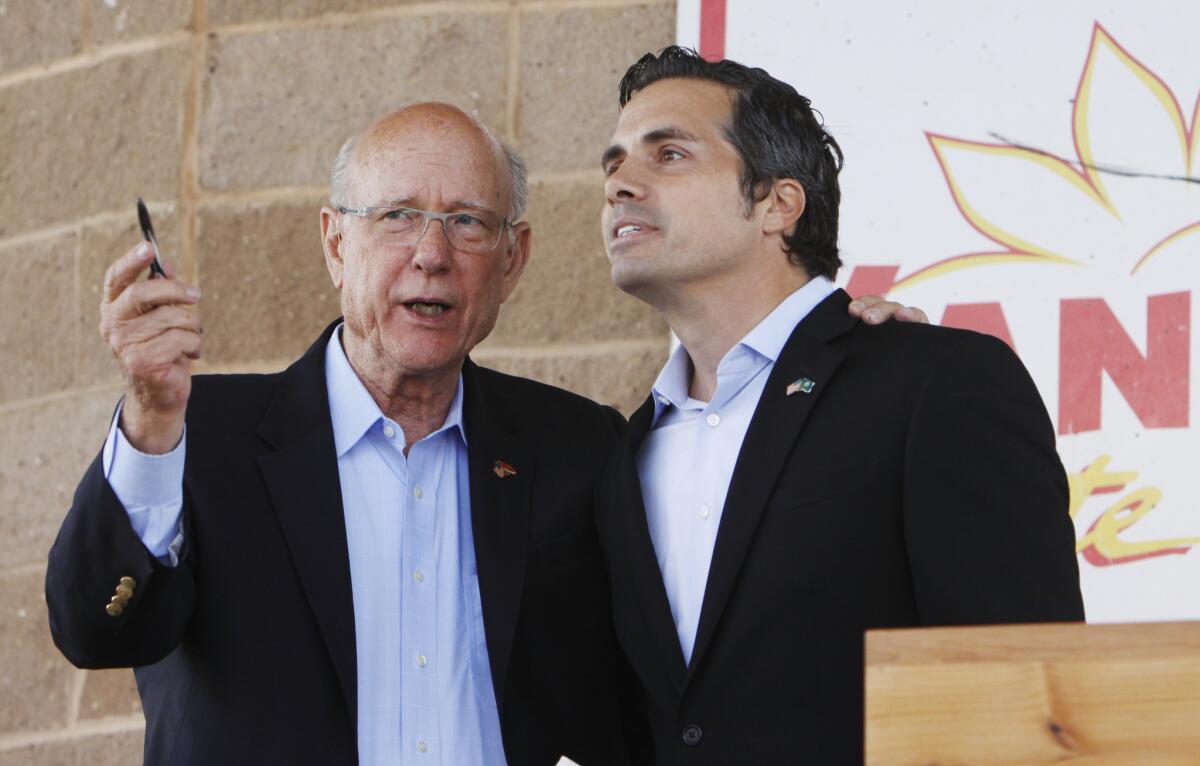New polls: Kansas has GOP on defense in its bid to take Senate

With less than a month until election day, new polls unveiled Sunday reinforced what’s become the theme of the 2014 midterms: It’s going to be close.
In Alaska and Arkansas, the latest polls continued to show Republican leads in Senate contests there. But Democrats in Colorado and North Carolina showed tenuous advantages, and the battle for Iowa’s Senate seat remained a dead heat, according to a series of statewide surveys by the CBS News/New York Times poll.
As Republicans look to capture six seats to take control of the Senate, the party is playing defense in Kansas, where incumbent Republican Sen. Pat Roberts is locked in a close race against Greg Orman, an independent candidate. The Democratic candidate in the race, Chad Taylor, dropped out last month, giving Orman a clear shot at Roberts in the drama-filled Kansas contest.
Orman has not said with which party he would caucus if he wins, but Republicans are campaigning hard against him, accusing him of being a Democrat in disguise.
Roberts faced a rough primary and has received flak from critics who say he has lost touch with the state after more than 30 years in Washington. Several establishment Republicans, including Sen. John McCain of Arizona and former Florida Gov. Jeb Bush, have stumped for Roberts in Kansas recently in an effort to save the embattled senator.
In addition to the NYT/CBS polls, results of NBC News/Marist polls in several states were also released Sunday. The two sets of surveys, which used different methods to poll voters in battleground states, showed similar results in two states where they overlapped, but offered different views of the Kansas race. The NBC/Marist poll is a traditional telephone survey while the NYT/CBS survey, conducted by YouGov, uses an online panel.
The NBC/Marist survey showed Orman ahead 48% to 38%. The CBS/New York Times survey showed the race neck-and-neck at 40% for each candidate.
Republicans are likely to pick up seats in Montana, South Dakota and West Virginia. That would leave them needing to win three more seats currently held by Democrats if none of their incumbents lost. Their prime opportunities come in close contests in Alaska, Arkansas, Colorado, Iowa, Louisiana and North Carolina.
In Alaska, Republican Dan Sullivan holds a 48%-to-42% lead over Democrat Sen. Mark Begich in the CBS/New York Times poll, which showed a similar lead for the Republican in September.
In Arkansas, the survey showed Rep. Tom Cotton continuing to hold an advantage over Democratic incumbent Sen. Mark Pryor, 45% to 41%.
In Louisiana, Democratic incumbent Mary Landrieu leads a multicandidate field for November, but is well short of the 50% she would need to avoid a runoff under the state’s system. In a second round, she would trail her main Republican opponent, Rep. Bill Cassidy, 47% to 41%, the CBS/NYT poll found.
Victories in those three states would give the GOP the seats they need for a majority if Roberts won in Kansas. If he loses, and Orman sides with the Democrats, the GOP would need at least one more seat.
But in North Carolina and Colorado, Democrats hold leads over Republican challengers, the CBS/NYT polls showed, results that were consistent with the poll’s numbers in September.
Democratic Sen. Kay Hagan of North Carolina outpaces Republican state House Speaker Thom Tillis in both the CBS/NYT and NBC/Marist polls and has a strong advantage when it comes to support from female voters.
In Colorado, Democratic Sen. Mark Udall leads his Republican challenger, Rep. Cory Gardner, 48% to 45% in the CBS/NYT poll.
The closest contest appears to be in Iowa, where Democratic Rep. Bruce Braley is locked in a tight battle. The CBS/NYT poll showed Braley slightly outpacing Republican state Sen. Joni Ernst, 44% to 43%. The NBC/Marist poll showed Ernst ahead, 46% to 44%. Both sets of results were well within the two surveys’ margins of error.
Follow @kurtisalee and email [email protected]
More to Read
Get the L.A. Times Politics newsletter
Deeply reported insights into legislation, politics and policy from Sacramento, Washington and beyond. In your inbox three times per week.
You may occasionally receive promotional content from the Los Angeles Times.











